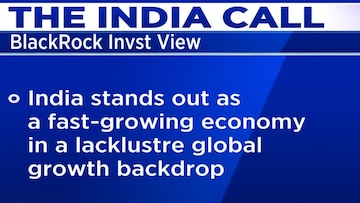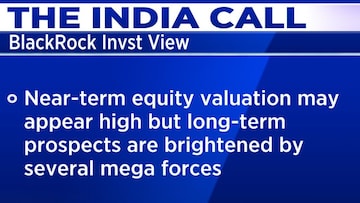According to him, the overall outlook for India remains positive, with strong economic fundamentals and ongoing reforms driving optimism. However, as China rolls out new stimulus measures, global investors could refocus their attention on the Chinese market, given its near-term profit potential. While India continues to offer long-term growth prospects, the renewed focus on China could create a temporary shift in capital flows, as investors look to capitalize on the Chinese market’s recovery efforts.
Below is the verbatim transcript of the interview on CNBC-TV18.
Q: Global markets have largely ignored all the fighting around the world, right? And there are many fights going on. There’s Russia, there’s Ukraine, there’s stuff in the Middle East, but the markets have hit new all-time highs. Oil markets have been largely unaffected by all of this. Do you think in one day we had a big reaction on oil and VIX etc. in the US because of Iran’s missiles? But do you think the markets will temper these moves very quickly? Or do you think this is different, especially when it comes to Iran and Israel? So far, the conflict seems a bit coordinated, right? I mean, there will be some attacks, and the other side will attack, provide a way out, something to save face for the other side. So, there was some element of coordination. This seems a little uncoordinated if I can use that word. So could your thoughts spiral?
A: Unfortunately, the market is getting used to these types of events. We have entered a much more geopolitically volatile environment in recent years. Maybe that’s a consequence of moving toward a more multipolar world, with the United States, China, tensions and all that. And more or less at the bottom, what we’re seeing are historical fault lines, pre-existing fault lines that are coming back to the surface: Russia, Ukraine, the Middle East and elsewhere. Unfortunately, this is likely to continue for years to come and we will have to deal with more and more such episodes.
What that means, however, is that the market is becoming more efficient, discounting them relatively quickly and analyzing them to focus on some of the other very important factors, whether it’s the US Federal Reserve tapering or China stimulus . And for now, of course, the human situation is tragic, but from a market perspective, the market seems to be much more focused on global growth and falling interest rates of different economies, and that combination is still quite positive for the risk of the moment.
Q: As of now, what would be the key factors to watch because your view is quite positive on US stocks in general?
A: Yes, we are quite constructive. So at the moment, of course, as investors, we are always nervous and anxious about everything. But at the moment, we would be more nervous about underinvestment than overinvestment. So we would continue to be constructive on risk, let’s say, in the US in particular, of course, we have this AI mega force, as we call it, at BlackRock, the largest investor in the world, and this continues and is expanding . We’ve seen a lot of excitement so far, pretty reasonably focused on core technology, chip makers and web services, and that’s fine.
Also read: China’s stock market boom may turn into bust like 2015, says Nomura
But what we think should happen now is a broadening of some of the enthusiasm towards more aspects of the ecosystem, the architecture around artificial intelligence (AI), that is, things like utilities and energy materials because, for now, AI is still a technology that can stub its toe. It still exists in the physical world and needs, in particular, an energetic architecture that provides it with the necessary calories to think its great thoughts. So we’re tempering our enthusiasm for AI a little bit and focusing more on that broader ecosystem, critically including energy, rather than just focusing on the big seven, certainly, although they have been that way.
Q: You like US markets, but what about an emerging market like India? You have highlighted in your note that demographics are in our favor, the workforce will increase and we will also have income growth, but at current valuations, is that a headwind?
A: There are many things I like in India, as you know very well. So, the combination of demographic increase plus productivity, digital inclusion, infrastructure, etc. I think the overall picture in India still looks very favorable, but there are always nuances.

I think the short term issue really has nothing to do with India. In reality, it could be China’s gravitational pull. So, as we all know, India has become, a few weeks ago, the largest component of the MSCI Emerging Markets, taking the crown from China. And that’s great, we’ve all enjoyed it. But I do believe that China is going to deliver on its stimulus promises, something we could see next week. It is very likely that some of the money that global investors have put to work outside China, whether in other emerging markets or elsewhere in Asia, will likely return to China.
Also read: Money moves from India to China, says Adrian Mowat
So, there might be a bit of a headwind; It has nothing to do with India, but with global capital flows returning to the world’s second-largest economy as they step on the accelerator. So it may be kind of a short-term challenge. Again, it is not India’s fault, but China’s. Therefore, this causes a short-term headwind. But again, from a broader perspective, there is a lot to like in terms of growth dynamics, reforms and inflation context, which is radically different from where we were just a few years ago. So, there’s a lot to like.
Q: Two brief questions. First, when China makes money, emerging market funds make money. History shows that all emerging markets make money. So is it this or that? If funds go to China, will it be negative for flows to India? Secondly, returning to geopolitics, if the oil infrastructure within Iran is affected. Do you think it will cause repercussions and that asset markets around the world will react?
A: So, on the first one, I think it’s both. If I can have my cake and eat it too. I think it’s both this and that. So in the very short term, we may see some purchases from China financed by other countries. So I think this may be a slight headwind briefly, but your broader point is the right one, which is general, and that’s why we at BlackRock are strategically overweight emerging markets. This backdrop of US Fed cuts and normal Chinese stimulus is quite encouraging for large-scale emerging market risk.
So if the big one, I guess China within the emerging markets framework, goes from being really flat on its back, the sentiment, the positioning and, more generally, the thinking towards China, has been extremely negative over the last few quarters . If that’s encouraging, you’re right, it should be encouraging for the broader asset class, including India, an important part of emerging markets.

As for the second question, at the moment it seems that this is relatively, of course, we should not underestimate the human element, that’s for sure, but from a market perspective, the market is considering this as something because, unfortunately, a part normal background music.
Of course, we are all watching the escalation cycle with both eyes. And if it looks like it’s starting to spiral and move to a different level where perhaps other powers are involved, then of course we would have to re-evaluate it. So let’s see that’s not it for now, if that changes we’ll adjust accordingly.
For the interview, watch the attached video.
Disclaimer:
The information contained in this post is for general information purposes only. We make no representations or warranties of any kind, express or implied, about the completeness, accuracy, reliability, suitability or availability with respect to the website or the information, products, services, or related graphics contained on the post for any purpose.
We respect the intellectual property rights of content creators. If you are the owner of any material featured on our website and have concerns about its use, please contact us. We are committed to addressing any copyright issues promptly and will remove any material within 2 days of receiving a request from the rightful owner.

